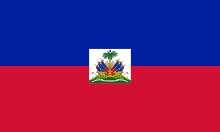Anti-Duvalier protest movement
Church radio stations, the only independent news sources, stopped broadcasting, making it very difficult for much of the country to get any information about the strikes.
It also responded to protests by arresting people, and forcing businessmen, civil servants, and military officials to swear loyalty to Duvalier in the palace.
Duvalier declared a nationwide day of mourning for the students murdered in November, and swore to try the police officers that had killed them.
He also drove around the capital throwing money from his car window, and fired some officials, but many people declared that the efforts to improve his image had not appeased them.
In the capital city, protesters handed out leaflets calling for Operation Déchoukaj, to organize a general strike against the regime.
Campaigners set fire to a court building and threw rocks at a Duvalier's home, although it is not known whether anyone was injured.
Protesters took over and destroyed government offices in some outer towns, and blocked major roadways around the country.
For several consecutive days in early February, Duvalier traveled around the capital as a symbol of his continuing control.
On 7 February 1986, Duvalier fled to France in a United States-supplied plane; however, before leaving, he set up the six-member National Council of Government (CNG) under the leadership of Army Commander Henri Namphy to rule the country after his exile.
[8] The Duvaliers settled in France and lived comfortably, though they were denied a request of political asylum by the French authorities.
In 1998, a Haitian-born photographer, Gérald Bloncourt, formed a committee in Paris to bring Duvalier to trial.
However, Duvalier's lawyer Sauveur Vaisse said that his client was still in France and denied that the exiled leader had fallen on hard times.
He said that exile had "broken" him, though what he described as the improving fortunes of the National Unity Party had "reinvigorated" him; he urged readiness among his supporters, without saying whether he intended to return to Haiti.
Duvalier lived in Paris with Véronique Roy, his longtime companion and chief public-relations representative, until his return to Haiti in late January 2011.

